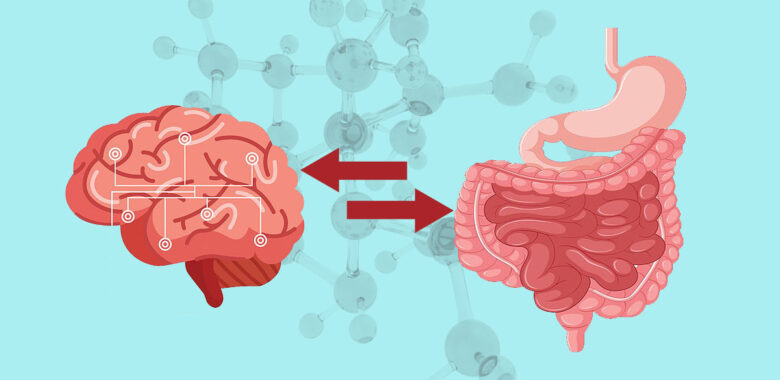The relationship between the gut and the brain is more profound than we may think. The health of our gut has a direct impact on our mental health, which has been researched more rigorously in the recent past. This relation is known as the gut-brain axis, and it is understood more every day that what we consume dramatically determines how we feel, think, and even how we deal with stress. If you ever remember feeling down after eating a poor meal or upbeat after a nutritious meal, you have experienced the gut-brain connection firsthand. So, what does diet do to mental wellness, and how can we optimise it?
What is the Gut-Brain Connection?
A communication pathway linking the brain to the digestive system forms the basis of the gut-brain connection. The vagus nerve, one of the longest in the human body, facilitates the gut-brain connection since it sends commands from the brain to the gut. Even though it may not seem so, this connection works both ways. The gut communicates with the brain and sends information that determines one’s mood, level of thinking, and mental health. It can be said that the state of one’s gut affects the mind as much as the state of the mind affects the gut.
The Connection Between the Gut and the Brain:
Along with the intestines come billions of microorganisms, usually referred to as the gut microbiome. In addition to the critical functions of digestion, these microorganisms are also responsible for the tunlz’o anavzii bsciff. Our microbiome actively synthesises biogenic amines such as serotonin and dopamine. These vital ones are primarily responsible for controlling one’s mood, sleep, emotional equilibrium, and so much more. The more worrying issue is that altered gut flora can cause anxiety and/or depression by changing brain chemistry.
The Importance of Gut Microbiota:
These organisms, from the fungi to the bacteria and even the viruses that reside in the digestive tract, form a community known as gut microbiota. When it comes to the human body, these microorganisms are paramount in nutrition as they aid in the digestion of food, the formation of useful vitamins alongside it, and even in the generation of short-chain fatty acids that play an astoundingly important role in revitalising and rebuilding the gut lining.
However, they do not stop at just nutrition – there is also an impact on brain activities as a direct side effect of these bacteria and additional gut microbes producing and/or modulating the amount of neurotransmitters such as biogenic amines. This clear intertwining bond between the brain and the gut shows that, one more time, taking care of one’s gut translates directly to the health of one’s mental condition.
The Influence of Diet on Mental Wellness:
Dietary choices have a direct and profound influence on the gut microbiome, which subsequently affects mental health and brain activity. Eating poorly contributes to the microbial imbalance known as dysbiosis, which, along with other factors, is a growing concern for mental problems. In contrast, balanced diets fortified with the right nutrients promote the well-being of the gut and, therefore, the mind.
The Influence of Diet on the Functioning of the Brain:
Some nutrients are significant to both gut and brain health. For example, some vitamins like B12, D, and folate are important for the psychosocial aspects, including mood and stepwise thinking processes. Some trace minerals like magnesium and zinc also help reduce stress and anxiety. Depression and cognitive decline are associated with the lack of these nutrients.
The Microbiome Alongside Mental Health:
Research indicates that patients with irritable bowel syndrome (IBS), Crohn’s disease, and other gut disorders also complain of anxiety and depression symptoms more frequently. The gut microbiome is important for producing certain neurotransmitters involved in our emotional well-being and its balance. An imbalance in gut microbiota poses a risk in the development of other mental issues. Hence, improving gut health is an approach to addressing the underlying conditions in these patients.
Essential Nutrients to Maintaining the Gut-Brain Interaction:
Prebiotics and Probiotics
Probiotics are live yeasts and bacteria that can be found in supplements and some fermented foods. They help restore the balance of the gut microbiome. Prebiotics, on the other hand, are fibres that encourage the growth of good bacteria in the gut. Together, probiotics and prebiotics are the key factors in maintaining the balance of the gut and aid in the proper function of the communication system between the gut and the brain.
The Importance of Omega-3 Fatty Acids
Omega-3 fatty acids are vital fats found in abundance in fatty fishes and flaxseeds. The listed foods, alongside others rich in omega-3s like salmon, mackerel, sardines, legumes, and other nuts, assist in regulating inflammation, which ensures other mental issues an individual might be dealing with are alleviated.
Fiber and Gut Health
One of the most important elements to keeping the gut healthy is dietary fibre. It helps with the proliferation of good bacteria as well as short-chain fatty acids, which manage the health of the gut and brain. Vegetables, fruits, and whole grains are some of the high-fibre foods that maintain gut and cognitive function.
Foods to Maintain a Balanced Gut and Brain:
Build a healthy gut-brain connection by consuming a variety of whole, nutrient-rich foods. Excellent probiotic-rich foods include yoghurt, kefir, and sauerkraut, while space food rich in omega-3s, such as salmon and walnuts, can enhance brain function. Foods like beans, lentils, and whole grains, which are rich in fibre, also promote a healthy gut microbiome.
Fermented Foods
Fermented foods are one of the best sources of probiotics. These foods assist in the proliferation of good bacteria, which can enhance gut and mental health. Adding fermented foods such as kimchi, miso, and kombucha into your diet can be greatly beneficial for these parts of your body.
Omega-3 Food Sources
Fish such as salmon, trout, and sardines are rich in omega-3 fatty acids, which are crucial for proper brain functioning. These fats help to improve inflammation, depression, and overall brain functionality. Eating these foods often can greatly benefit your mental health.
Whole Grains and Fiber Credentials
Whole grains, including oats, quinoa, and brown rice, contain a good amount of fibre and other important constituents needed to promote overall gut and brain health. These foods help ensure energy is released consistently over time, resulting in enhanced mood and better mental health.
Foods to Stay Away from to Improve Mental Wellbeing:
Highly Processed Foods
A processed food diet is usually accompanied by an increased intake of sugar, unhealthy fats, and other synthetic substances known to be detrimental to wellbeing. These foods harm gut microbiota, which can cause inflammation and cognitive dysfunction.
Excess Sugars and Their Impact
Eating too much sugar causes blood sugar levels to rise and fall rapidly, resulting in mood changes and impaired mental clarity. High sugar consumption also increases the likelihood of depression, anxiety, and other mental illnesses. Less sugar, on the other hand, improves gut and brain health, so it is advisable to reduce the amount of sugar consumed.
The Impact of Good Hydration on Mental Health:
Digestion and brain activity optimally function only when one is properly hydrated. Water eliminates waste, assists in the utilisation of nutrients, and maintains adequate neurotransmitter levels. A deficiency in hydration can result in poor mental clarity and reduced cognitive ability.
Stress Management and Quality of Sleep:
Prolonged periods of stress and inadequate sleep have been associated with issues with the body’s gut-brain axis, resulting in gut and psychological disturbances. Relaxation, physical activity, good quality sleep, and even rest allow one to mitigate stress, which benefits the brain and gut simultaneously.
Conclusion:
To wrap up, everything regarding nutrition, the microbiome, and mental health is very much interrelated. Optimising one’s nutrition by adding probiotics, nutrient-dense foods, dietary fibre, omega-3-rich foods, and multivitamins enhances gut and brain function, thus improving mood, mental sharpness, and overall health. By being mindful of hydration, adopting better eating patterns, and adopting healthy lifestyle habits, one can optimise brain and gut health and fully enjoy life.
FAQs:
1. Which foods can I consume to help with the functioning of the brain and gut simultaneously?
Eating foods that have probiotics, omega-3 fatty acids, whole grains, and fibres is very good for the gut as well as the brain. You should also include yoghurt, fatty fish, and various fruits and vegetables, especially those that contain fibre, in your diet.
2. Can my worries and stress levels impact my gut health?
Disruptive stress levels can impact the microorganisms that reside in the gut and cause gastrointestinal as well as psychological problems, so yes.
3. How does hydration relate to mental wellness?
Water helps wash out vital organs like the brain, aids in digestion, removes wastes, transmits messages, and provides hydration. In addition, it is important for the formation of nerve transmitters.
4. What is the impact of sugar on mental health?
Sugar is not harmful to the brain, but the excess intake of sugar can lead to intense changes in mood, an increased rate of cognitive decline, and a higher probability of depression and anxiety.
5. What are some ways I can help my gut improve naturally?
Eating a balanced diet, consuming fermented foods, drinking plenty of water, and reducing stress levels can all help improve gut health naturally.




